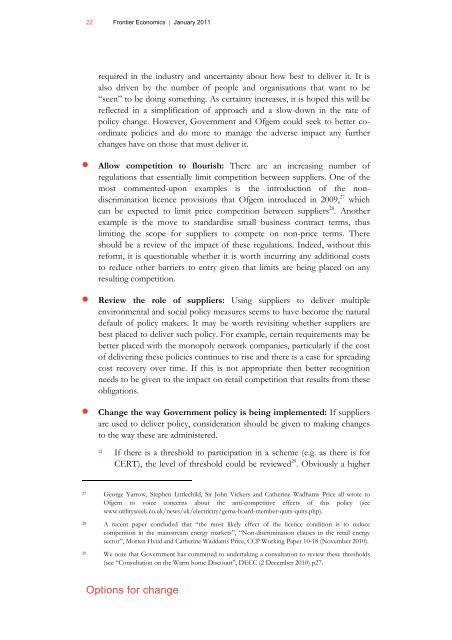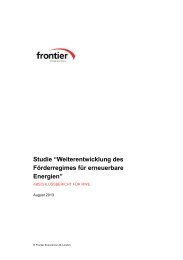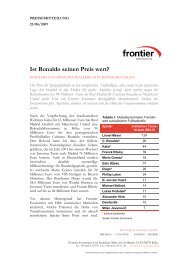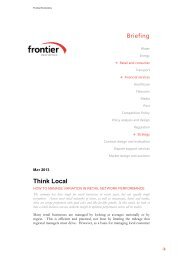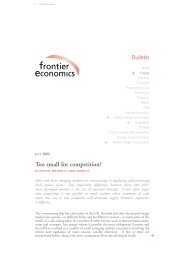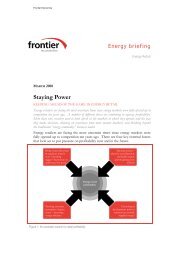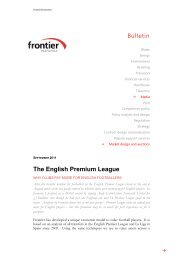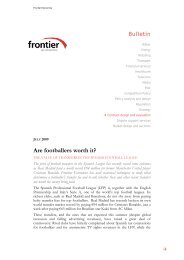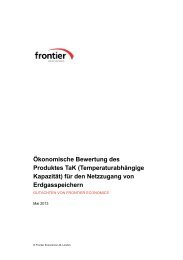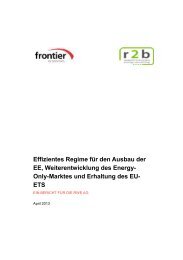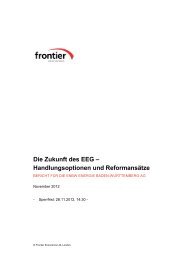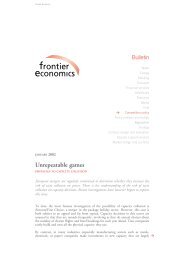competition and entry in the gb electricity retail market.pdf - Frontier ...
competition and entry in the gb electricity retail market.pdf - Frontier ...
competition and entry in the gb electricity retail market.pdf - Frontier ...
You also want an ePaper? Increase the reach of your titles
YUMPU automatically turns print PDFs into web optimized ePapers that Google loves.
22 <strong>Frontier</strong> Economics | January 2011<br />
required <strong>in</strong> <strong>the</strong> <strong>in</strong>dustry <strong>and</strong> uncerta<strong>in</strong>ty about how best to deliver it. It is<br />
also driven by <strong>the</strong> number of people <strong>and</strong> organisations that want to be<br />
“seen” to be do<strong>in</strong>g someth<strong>in</strong>g. As certa<strong>in</strong>ty <strong>in</strong>creases, it is hoped this will be<br />
reflected <strong>in</strong> a simplification of approach <strong>and</strong> a slow-down <strong>in</strong> <strong>the</strong> rate of<br />
policy change. However, Government <strong>and</strong> Ofgem could seek to better coord<strong>in</strong>ate<br />
policies <strong>and</strong> do more to manage <strong>the</strong> adverse impact any fur<strong>the</strong>r<br />
changes have on those that must deliver it.<br />
• Allow <strong>competition</strong> to flourish: There are an <strong>in</strong>creas<strong>in</strong>g number of<br />
regulations that essentially limit <strong>competition</strong> between suppliers. One of <strong>the</strong><br />
most commented-upon examples is <strong>the</strong> <strong>in</strong>troduction of <strong>the</strong> nondiscrim<strong>in</strong>ation<br />
licence provisions that Ofgem <strong>in</strong>troduced <strong>in</strong> 2009, 27 which<br />
can be expected to limit price <strong>competition</strong> between suppliers 28 . Ano<strong>the</strong>r<br />
example is <strong>the</strong> move to st<strong>and</strong>ardise small bus<strong>in</strong>ess contract terms, thus<br />
limit<strong>in</strong>g <strong>the</strong> scope for suppliers to compete on non-price terms. There<br />
should be a review of <strong>the</strong> impact of <strong>the</strong>se regulations. Indeed, without this<br />
reform, it is questionable whe<strong>the</strong>r it is worth <strong>in</strong>curr<strong>in</strong>g any additional costs<br />
to reduce o<strong>the</strong>r barriers to <strong>entry</strong> given that limits are be<strong>in</strong>g placed on any<br />
result<strong>in</strong>g <strong>competition</strong>.<br />
• Review <strong>the</strong> role of suppliers: Us<strong>in</strong>g suppliers to deliver multiple<br />
environmental <strong>and</strong> social policy measures seems to have become <strong>the</strong> natural<br />
default of policy makers. It may be worth revisit<strong>in</strong>g whe<strong>the</strong>r suppliers are<br />
best placed to deliver such policy. For example, certa<strong>in</strong> requirements may be<br />
better placed with <strong>the</strong> monopoly network companies, particularly if <strong>the</strong> cost<br />
of deliver<strong>in</strong>g <strong>the</strong>se policies cont<strong>in</strong>ues to rise <strong>and</strong> <strong>the</strong>re is a case for spread<strong>in</strong>g<br />
cost recovery over time. If this is not appropriate <strong>the</strong>n better recognition<br />
needs to be given to <strong>the</strong> impact on <strong>retail</strong> <strong>competition</strong> that results from <strong>the</strong>se<br />
obligations.<br />
• Change <strong>the</strong> way Government policy is be<strong>in</strong>g implemented: If suppliers<br />
are used to deliver policy, consideration should be given to mak<strong>in</strong>g changes<br />
to <strong>the</strong> way <strong>the</strong>se are adm<strong>in</strong>istered.<br />
If <strong>the</strong>re is a threshold to participation <strong>in</strong> a scheme (e.g. as <strong>the</strong>re is for<br />
CERT), <strong>the</strong> level of threshold could be reviewed 29 . Obviously a higher<br />
27 George Yarrow, Stephen Littlechild, Sir John Vickers <strong>and</strong> Ca<strong>the</strong>r<strong>in</strong>e Wadhams Price all wrote to<br />
Ofgem to voice concerns about <strong>the</strong> anti-competitive effects of this policy (see<br />
www.utilityweek.co.uk/news/uk/<strong>electricity</strong>/gema-board-member-quits-quits.php).<br />
28 A recent paper concluded that “<strong>the</strong> most likely effect of <strong>the</strong> licence condition is to reduce<br />
<strong>competition</strong> <strong>in</strong> <strong>the</strong> ma<strong>in</strong>stream energy <strong>market</strong>s”, “Non-discrim<strong>in</strong>ation clauses <strong>in</strong> <strong>the</strong> <strong>retail</strong> energy<br />
sector”, Morten Hviid <strong>and</strong> Ca<strong>the</strong>r<strong>in</strong>e Waddams Price, CCP Work<strong>in</strong>g Paper 10-18 (November 2010).<br />
29 We note that Government has committed to undertak<strong>in</strong>g a consultation to review <strong>the</strong>se thresholds<br />
(see “Consultation on <strong>the</strong> Warm home Discount”, DECC (2 December 2010) p27.<br />
Options for change


